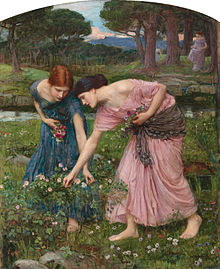Poetry 2: Understanding the Text
I am thinking, therefore I am 我思故我在
Cogito ergo sum, "I think, therefore I am", or better "I am thinking, therefore I exist" is a philosophical proposition by René Descartes. The simple meaning of the Latin phrase is that thinking proves the thinker exists, or, as Descartes explains, "[W]e cannot doubt of our existence while we doubt … ." If valid it refutes scepticism since to doubt one exists is self-contradictory.

René Descartes
Focal point 焦點
Narrative poetry 敘事詩
Narrative poetry is a form of poetry that tells a story, often making use of the voices of a narrator and characters as well; the entire story is usually written in metred verse. Narrative poems do not have to follow rhythmic patterns. The poems that make up this genre may be short or long, and the story it relates to may be complex. It is usually dramatic, with objectives, diverse characters, and metre. Narrative poems include epics, ballads, idylls, and lays.
Lyric poetry 抒情詩
Lyric poetry is a form of poetry which expresses personal emotions or feelings, typically spoken in the first person. The term derives from a form of Ancient Greek literature, the lyric, which was defined by its musical accompaniment, usually on a stringed instrument known as a lyre. The term owes its importance in literary theory to the division developed by Aristotle between three broad categories of poetry: lyrical, dramatic and epic.
The Dramatic monologue 戲劇獨白
Dramatic monologue, also known as a persona poem, is a type of poetry written in the form of a speech of an individual character. M.H. Abrams notes the following three features of the dramatic monologue as it applies to poetry:
1. A single person, who is patently not the poet, utters the speech that makes up the whole of the poem, in a specific situation at a critical moment […].
2. This person addresses and interacts with one or more other people; but we know of the auditors' presence, and what they say and do, only from clues in the discourse of the single speaker.
3. The main principle controlling the poet's choice and formulation of what the lyric speaker says is to reveal to the reader, in a way that enhances its interest, the speaker's temperament and character.
Stanza 詩的一節
In poetry, a stanza is a grouped set of lines within a poem, usually set off from other stanzas by a blank line or indentation. Stanzas can have regular rhyme and metrical schemes, though stanzas are not strictly required to have either. There are many unique forms of stanzas. Some stanzaic forms are simple, such as four-line quatrains. Other forms are more complex, such as the Spenserian stanza. Fixed verse poems, such as sestinas, can be defined by the number and form of their stanzas. The term stanza is similar to strophe, though strophe is sometimes used to refer to irregular of lines, as opposed to regular, rhymed stanzas.
paraphrase 釋義
para-: 平行並立
"Poetry is higher than history"—Aristotle
Poetry is more "philosophical" than history, according to Aristotle, because in order to unfold a plot in a manner that is convincing to the audience, the poet must grasp and represent the internal logic, the necessity, of the outcome of those events.
Carpe diem 活在當下
Carpe diem is a Latin aphorism, usually translated "seize the day", taken from the Roman poet Horace's Odes (23 BC).
To the Virgins, to Make Much of Time: "To the Virgins, to Make Much of Time" is a poem written by Robert Herrick in the 17th century. The poem is in the genre of carpe diem, Latin for seize the day.

prime 最初的
pri-: first
couplet 對句;雙韻
A couplet is a pair of lines of metre in poetry. Couplets usually comprise two lines that rhyme and have the same metre. A couplet may be formal (closed) or run-on (open). In a formal couplet, each of the two lines is end-stopped, implying that there is a grammatical pause at the end of a line of verse. In a run-on couplet, the meaning of the first line continues to the second.
heroic poetry 英雄詩歌
Thine 你的東西;你的;您的
The word thou is a second person singular pronoun in English. It is now largely archaic, having been replaced in almost all contexts by you. It is used in parts of Northern England and by Scots. Thou is the nominative form; the oblique/objective form is thee (functioning as both accusative and dative), and the possessive is thy or thine.
Hyperbole 誇飾
Hyperbole is the use of exaggeration as a rhetorical device or figure of speech. It is used in poems to create emphasis on a situation. It may be used to evoke strong feelings or to create a strong impression, but is not meant to be taken literally. An example of hyperbole is: "The bag weighed a ton." Hyperbole makes the point that the bag was very heavy, though it probably does not weigh a ton.


 留言列表
留言列表